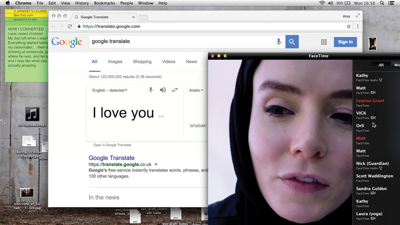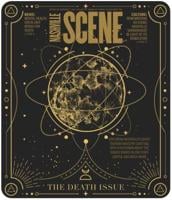
For a thriller, Profile only really achieves one thing: being as grating as possible. And that’s not entirely meant as negative criticism — it evokes a very contemporary anxiety about online manipulation.
Director Timur Bekmambetov produced the Unfriended movies and Searching, all of which were designed to look as though they were entirely recorded via a computer screen. Adapting French writer Anna Erelle’s nonfiction account of her infiltration of ISIS’ schemes to recruit European women, Profile changes the setting to London.
But Profile’s emphasis is on its jangled-nerves mood. We’re always just 30 seconds from a new video call or some other electronic buzz, not to mention the needle-drops of moody covers of “Get Lucky” and “Creep,” sung by women — an approach that is rather clichéd these days. Like Unfriended, Profile is told entirely through screens — and video images made on and for them. As a film, it plays smaller than life, though it successfully portrays a sort of Extremely Online mood, wherein one’s attention span is completely frayed because three important (or seemingly important, anyway) things are happening simultaneously. Profile captures what it feels like to have one friend call you on your phone while you’re in the middle of a Zoom session with another.
Trying to move up in her career, Amy (Valene Kane) pitches her boss Vicky (Christine Adams) a TV news report about her efforts to lure ISIS into attempting to radicalize her via Facebook and Skype. Amy creates a new Facebook persona named Melody Nelson with a bare-bones profile claiming she has just converted to Islam, and starts interacting with Islamist videos and comments. Bilel (Shazad Latif), a Pakistani-British man now fighting in Syria, contacts her almost immediately. He’s handsome and charming, but he ignores all the warning signs that she really knows nothing about Islam and is trying to entrap him. Instead, he invites her to join him in Syria during their second video conversation.
If the film put more emphasis on character development, this turn of events might be more plausible. Instead it turns into an improbable and frankly unbelievable love story. In an early scene, the audience is given a glimpse of an email from Amy’s bank reminding her that she has a low balance. Not content with this hint about the desperate state of her finances, the film later shows us the many messages from her landlord about her debt. However, she jumps from paranoia about Arabs and Muslims — flipping out when she learns that her TV station’s tech-support assistant Lou (Amir Rahimzadeh) is Syrian-British — to infatuation with Bilel in only a few days. While Bilel is obviously up to no good, Latif’s performance adeptly conveys Bilel’s expertise in grooming and his ability to switch on the charisma. Even so, it never feels like enough to change the life of an adult woman with no attraction to ISIS or real interest in Middle Eastern politics.
At its heart, Profile expresses a timeless racist fear about white women being seduced by men of color, modernized with European Islamophobia and anxieties about online culture. Of course, women — and men — being radicalized online by ISIS is a real problem. But Profile isn’t interested in the reasons behind that problem, which are a bit deeper than falling in love with hot recruiters. The film seems impressed with its own technical virtuosity, even though it repeats the same basic style of Unfriended while making its possibilities seem much more limited.
Profile expresses something real about the way we can fall for other people’s online projections of themselves, but the political context is just a trapping.





